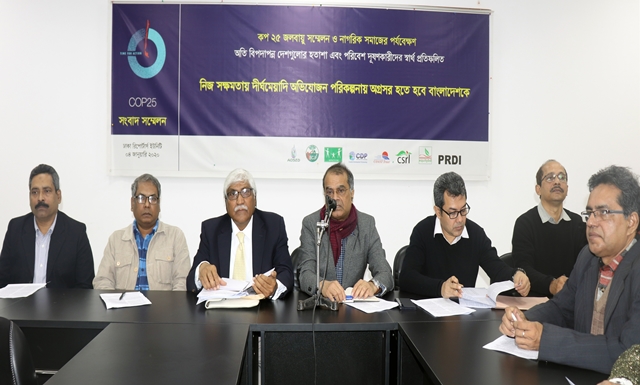SAM
Published:2020-01-05 04:02:29 BdST
BD should lead Climate Vulnerable Forum in 2020 GCC
STAFF CORRESPONDENT
Civil Society climate advocacy networks have criticized the CoP 25 outcome as frustrated, as the negotiation loosed the trust of MVCs (Most Vulnerable Country) & LDCs (Least Developed Countries) also in fact work and served the polluters interest.
They made a recommendation to the Bangladesh government to lead the CVF (Climate Vulnerable Forum) in the next climate conference in Glasgow in Dec 2020, as our Prime Minister has elected recently as “Chair” of the CVF.
They also opined that the government needs to set her climate change strategies (especially Adaptation Strategies) with her own capacity and resources.
The press conference titled “Madrid Climate Conference and Civil Society Observations” is moderated by M. Rezaul Karim Chowdhury of COAST Trust and EquityBD.
Dr. Atiq Rahaman of BCAS (Bangladesh Centre for Advance Study), Md. Ziaul Hoque Mukta from CSRL (Campaign for Sustainable Rural Livelihood), Md. Shamsuddoha from CPRD (Center for Participatory Research & Development), Md. Motahar Hossen of BCJF (Bangladesh Climate Journalist Forum) spoke in the event.
The keynote presented by Syed Aminul Hoque from COAST Trust.
In the keynote presentation, Aminul Hoque said that the negotiation in CoP 25 in Madrid was the longest in history, but ended with a deadlock and disappointment over most of the important issues. Major emitters failed to show how they plan to increase ambition by 2020 and broken their promises to long term finance that was much expected by MVCs and LDCs.
Finalization of the Paris agreement Rulebook is yet to be completed. The existing deep divide and contentious between developed and vulnerable countries might hamper the next negotiation in 2020 and deeper the crisis towards a solution. So that the government has to consider it critically and will have to take initiative accordingly in next climate conference (CoP 26) that will be held in Glasgow in Dec 2020.
Dr. Atiq said that the politics and fossil-fuel interests taking place above people and the planet. These are played by the United States, Japan, Australia and Brazil, once again exposed their lack of goodwill to save the millions of vulnerable, which is a willful rejection to the science.
Ziual Hoque Mukta said that due to connivance between rich and some advance developing countries, we have loosed the CBDR (Common but Differentiated Responsibilities) principle in Paris Agreement (PA) which has weaken the negotiation capacity of MVCs (Most Vulnerable Countries) that turned the PA into non-binding in implementation.
He also added the government to explore separate forums under MVCs in next conference.
Md. Shamsuddoha said that the negotiation is succeeded in the sense that, developing countries didn’t compromise with many critical issues especially reporting on reducing GHGs (Green House Gases), warring the fact of double-counting of GHG reduction and WIM (Warsaw International Mechanism) review and governance.
So, there is opportunity to take effective preparation for government engaging CSO (Civil Society), academicians & experts for broader advocacy. There should be linked with the UK based CSOs in this regard for an effective outcome in CoP 26 in Glasgow.
Unauthorized use or reproduction of The Finance Today content for commercial purposes is strictly prohibited.


